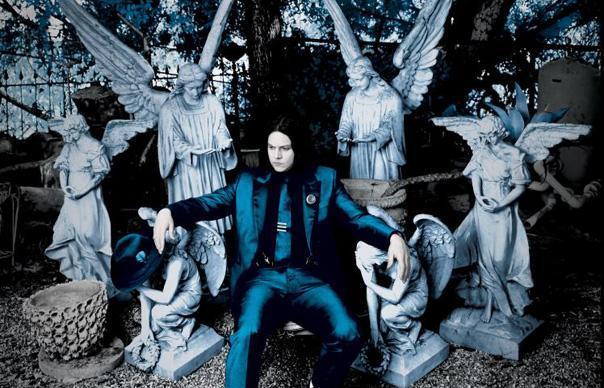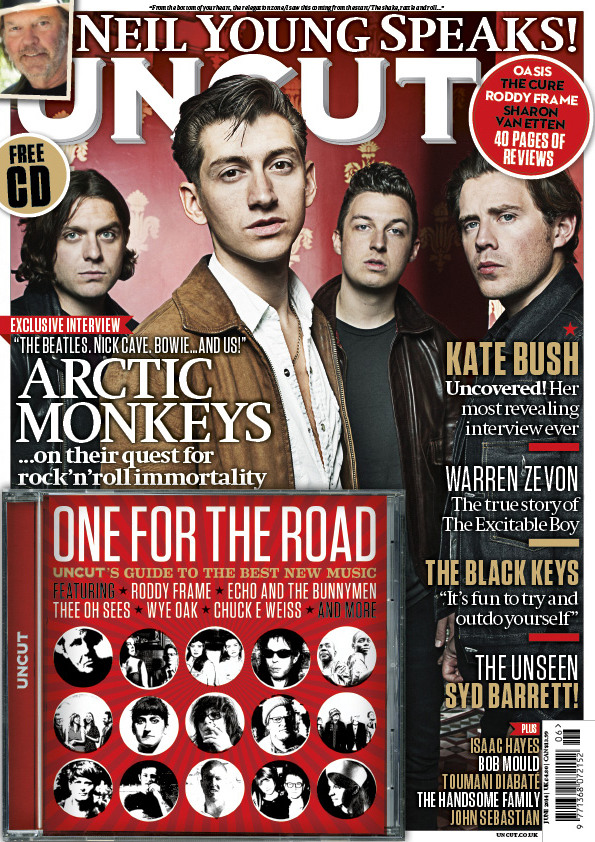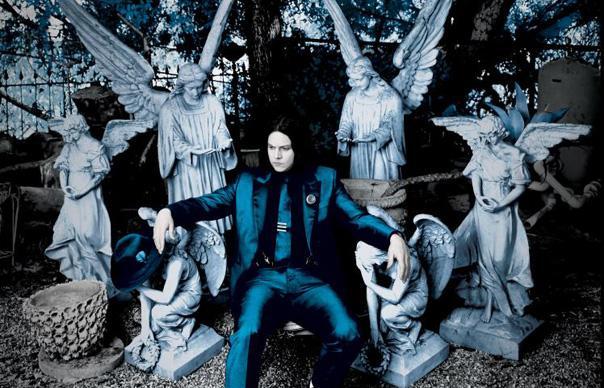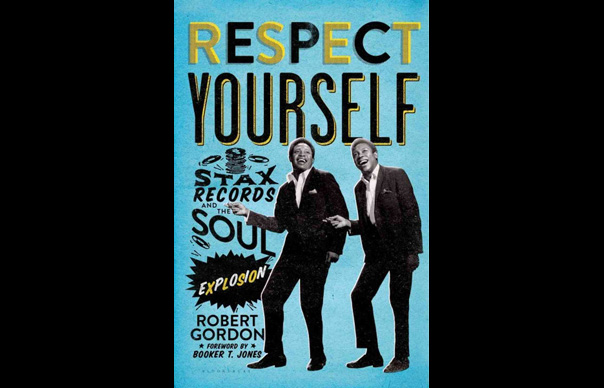The live album of LCD Soundsystem’s final gig at Madison Square Garden is finally being released tomorrow (April 19) for this year’s Record Store Day, in full, as a 5LP set. Back in Uncut’s November 2012 issue (Take 186), we met LCD’s James Murphy to hear his thoughts on their farewell concert, his reasons for breaking up the band, and the plans he has for a post-LCD career: “I don’t,” he says. “And it’s terrifying!” Words: Stephen Troussé
_____________________________
James Murphy is straight off a transatlantic flight, installed in a corner of the London offices of the production company behind Shut Up And Play The Hits, the film about the last days of his band, LCD Soundsystem. He is crumpled, unshaven and nursing a painfully gammy foot.
“Ultimate fighting injury?” Uncut enquires, referring to the mixed martial art for which he’s an unlikely evangelist. “Ultimate drinking injury,” he groans. Nevertheless, even an under-the-weather James Murphy is a force to be reckoned with. Shut Up And Play The Hits centres around LCD’s spectacular swansong at Madison Square Garden in April last year. It’s ironically titled because, through backstage chatter, frontman humility, TV interviews and post-show hangover, Murphy just can’t stop justifying, eulogising, wisecracking, pondering the peculiar history of his band. He was well into his thirties before forming LCD, with years of life experience as provincial punk, literature student, indie scenester, jobbing engineer. Consequently, when success eventually called, he was thoroughly prepared.
His three albums – LCD Soundsystem, Sound Of Silver and This Is Happening – add up to something like the Great New York Novel of the noughties, incorporating the desperate hedonism, high anxiety, self-conscious snark, whipsmart wit and post-Imperial melancholy of that curdled decade. Still fulfilling promotional obligations 18 months after he supposedly quit, Murphy occasionally plays at being jaded, but his beautiful, lively mind is relentless. In the course of an hour’s conversation, he’s part-Louis CK schlubby idealist, part-Lester Bangs gonzo philosopher and part-Sam Lipsyte scabrous cynic. The epigram to Shut Up And Play The Hits says, “If it’s a funeral… let’s have the best funeral ever.” Does it feel like it’s turning into the longest wake ever? “Holy shit, yes,” he says with a wry smile. “It’s a very long march to the barrow ground.”
_____________________________
Is it weird, having to obsessively rake over the embers of the last day of your band?
It’s not that weird. Everything weird really happened early on in the band. And everything after that, that’s supposed to seem weird, just never seems weird, relative to the band happening at all. Raking over it? This is my job! My job is fucking weird.
What were the weird things about LCD Soundsystem?
Just the band being successful. Or before the band started, the things that prompted me to start writing “Losing My Edge” were so weird. Being a DJ suddenly, being invited to parties, and having something to lose. After playing music and being involved in music my whole life, and failing comically. Or not even failing grandiosely – just sinking. Failing mediocrely! Nothing prepared me for having my moment in the sun. Which I considered to be before the band. New York likes art stars. It doesn’t like movie stars. So I was an art star, and we were weird and cool and ephemeral. That was so weird that everything that subsequently happened has seemed like a tiny ripple effect of that big bang, that cataclysmic event.
You played your first gig in London. Did you ever have an inkling that this might be, if not a career, an ongoing project?
I don’t know. I was pretty aggressive then and pretty crazy. Yeah, fuck it! We’re going to do things weird, we’re going to do things our way! I’m not working a tour, we’re doing some weird shows. Let’s do it! Then I made an album, gave it to the Soulwax guys and they were like, “Your life is over, dude.” And I was like, “Why?” They said, “It’s good. You’re going to be on tour.” So I said, “I’m not going to fucking do that.” “You say that. But we don’t want to DJ, and here we are.”
In the movie, the author Chuck Klosterman wonders what the defining failure of the band was. Was it that you couldn’t escape that treadmill or bend it to your will? Is quitting a way of getting the craziness back?
Yeah, it definitely is. I try to take people equally seriously. I try to take fans seriously, even if they’re fucking crazy. I try to take people at the record company seriously, sometimes though they behave in ways that prohibit you from taking them seriously. So I always try to err on the side of “We-ee-eelll… maybe you have a point.” That makes a lot of things difficult. It’s one of those jobs like being a triage doctor. What you want to do is perform microsurgery to save that knee… but that guy over there was just SHOT! In the FACE! So you have to know that you can’t give 100 per cent ever. You’re just running around trying to save lives.
And you never get the satisfaction of saying, “The last stitch – can we take that off?”
“Oh, beautiful scar, Dr White.” “Thank you!” That wore me out. Leaving the record company meeting and they’re saying, “OK, well, there’s no extra tracks? You’re only going to make one video? Is there anything three-and-a-half-minutes long? The song people respond to most is almost nine minutes long and it’s got a three-minute, almost inaudible, intro? Ugh.” You’re just like: arghhh. You go on tour and people are emailing: “Why aren’t you in Des Moines, Iowa? You only play where people think you’re cool?” You’re constantly disappointing people. That wears you out, if you care. If the other alternative is that you don’t care, I can’t do that. People say, “Well, don’t do Facebook, don’t look at it, let the people do their job!” But I can’t. This represents me. LCD Soundsystem represents me. No person is going to answer questions for me on the email interview! No-one’s going to post things on my website that are supposed to be from me! Because then you’re like, what’s the fucking point? If I start complaining, I should quit. So we quit. Because it was too much.
How did the movie come about?
Before the decision to end the band, someone told me, “Oh, the BBC wants to do something on you, they have these directors who did a Blur thing.” So we met up with them a couple of times and I really liked them. The BBC thing didn’t work out, so we decided to do it ourselves. At one point we thought, let’s just do a fiction movie. The movie was called What It’s Like To Make Things. It would just be all these weird dream sequences. I was trying to get Kanye to be in all my dreams. I didn’t want to see the band play, I just wanted one scene from the concert, the shot of the balloons dropping. And we were like, cool, let’s get a permit to shoot in Madison Square Garden. But the permit was, like, the budget. For the whole movie. We’re like, “OK, if we’re going to spend this money, let’s shoot the concert at least.” We wanted something that could be the whole arc if we needed it to be. Rather than trying to shoot a movie but only having half of it, and because of budget pressures having to cobble something together and release it.
How much input did you have?
Nothing in the narrative. I was really there for the concert footage and the concert itself. I know who plays what, what’s important to me. Naturally, the editor is picking a few shots that seem a little too rockstarry for me. I don’t like those. I like it to look like a street fight. And I think it does a good job of looking like a street fight! There are moments that are quite beautiful. I like early ’70s American films and I think they’re beautiful in a rough way, and when the beauty happens you’re unprepared for it.
Is there a danger that the movie replaces your memories?
That’s not even a danger, it’s totally replaced my memory. I don’t remember the show. I remember polaroids. The moment when I first crinkled up a lyric sheet and threw it away. I always have my lyrics in a pile in case I get stuck. Very rarely actually looked at them. The first time I was about to put it under I thought I will never, ever have to sing that again. I’ll never sing this again! To have these beat-up, five-year-old lyric sheets which have notes on, to know that you’re destroying something that might be important to someone else. Or it might be important to you later… I remember when I threw out my school yearbooks. I knew – ‘I’m going to regret this.’ I threw out all my Smiths shirts – this is a regret in the making. You should do stuff you regret. Don’t look back? A little bit. More like look back in anger!
When you think of bands quitting at the top, you think of Ziggy Stardust or The Jam. Rarely American bands…
No, because we don’t fucking stop. We keep chasing the paycheck. The Rolling Stones took more than the blues from America. I just wanted to have all the bad ideas fully realised. Why don’t we do a balloon drop? Or why don’t we build a spaceship made out of cardboard and make shitty video visuals with models on strings? Why not? That’s like 15 bucks, let’s do that. I loved fully blowing out all the dumb ideas we’d never had time to do. If we’d done that at the beginning of the tour we would have had all these beautiful set pieces that would have made economic sense. Instead we burned almost all the money we made that year. We lost everything! It was brutal. That show lost so much money. People on the internet are like – oh, I get it, you’re going to cash in at Madison Square Garden. You have NO IDEA how this business works. You don’t make anything for playing at Madison Square Garden! They keep all the money because they’re Madison Square Garden. What are you going to do? Go to the OTHER Madison Square Garden? To put on a show like that there are 1,500 union guys. That’s going to a 1,000 bucks per head. You get the balloon truck – the balloon truck held my landing dock hostage for hours and took us for an extra $5,000 on the day! We couldn’t get our gear. Shit like that – hilarious. We barely got a soundcheck and then I pulled the band off early so Liquid Liquid could get a soundcheck because they played first. I was so angry and then I was like – that’s our band! Our band doesn’t get a soundcheck for our last show at Madison Square Garden and I drag us off because Liquid Liquid – who we love – has to get a soundcheck. That’s a pretty big eulogy for us.
Do you have your post-LCD career as carefully planned as the farewell?
That’s the beauty of it, I don’t, and it’s terrifying. I felt like the band was born out of a weird miasmic sludge of time and influence and fucking around and all this stuff. Ironically, the band born out of this created less craziness and more and more order. Then I was like: what if I go and make a fourth record and I don’t know what to do? That’s not a big deal. But what’s the point? Why don’t I just go back to that chaos? That mass of energy. The only fears you have when you get bigger are – what if you fail? That’s boring. Now I’m like – who knows? People tell me people are going to remember your band forever! No, they’re not! People barely remember Kurt Cobain. He was in a huge band and he killed himself? That’s the way you never die. People won’t say, hey, remember that guy who was sad so he quit, but maintained friendships with the people he worked with? What an epic tragedy! It’s almost Greek!
You seem busier than when you were in the band…
I am. It’s been an unexpectedly difficult year. I’m building a new studio. I’m trying to open a store. It’s time-consuming. It’s also expensive. I have found no-one is willing to do construction for free. So I am DJing a LOT. It’s my job now – I DJ. I have the jumpsuit to prove it.
So what happens if you wake up with an awesome idea for an LCD song?
I just write a song. What’s the difference, man? This is the epic joke! LCD is a bunch of things. It’s me in the studio making a record. Two: it’s that group of people touring. Thirdly, it was the thing signed to EMI. And four, it was an entity that fans had varying relationships with and understandings of. I wanted to stop the train of the mass of those things. So I’m no longer signed. I’ve said “I’m done!” so we can memorialise that this is the end of LCD. It’s like I have a manufacturing plant but I don’t want to make plastic bags anymore. But I still have this plant. I’ll make music. I still DJ with Pat [Mahoney]. I see all my friends. Nothing happened. I just wanted to get off the train. A friend asked me to cover a song for a movie recently, and I was calling everyone up and said, you wanna do this? One guy was like – you’d do that? Use the LCD name? But if it’s the same group of us covering a song? If I call it James Murphy And The Murphtones, is that better? Who cares? And they’re like, people will get upset! Um, that’s the beauty of quitting! I don’t give a shit! That guy who cared? He quit! Now you get me!
_____________________________
I Can Change: five post-LCD career options, by the man himself
1: Novelist
Is writing the ultimate freedom? More like the ultimate nightmare. I have no delusions about looking out of the window wistfully and jotting my thoughts while someone brings me tea. I said once that I was working on something and that’s been turned into I’m writing a novel. I take “I’m writing a novel” as a phrase very seriously. I am not Writing A Novel. I am working on something, sporadically taking notes. I’ve written scenes out. I know what the principal themes are. I know the settings and characters. But I think it’s a big ’un.
2: Soundtrack composer
Working on Greenberg was great but people say “Do you want to do more?” and I say NO. I did it because Noah and I had a good relationship and he was working across the street from my studio. So I dealt with Noah. I could put my ego aside because it’s like I’m helping him paint his house. At the same time, I don’t have eight people saying, “I think it’s too mauve. What do you think?” Most of that job, you have one note from the producer saying make it more lively. One note from the music supervisor saying mellow it out a little. One note from the director saying don’t listen to those guys. Nuh-uh. I have no interest in that world. If someone asks me to make a soundtrack I will make music. If you would license that for your film, please do.
3: Mom and pop store owner
We’re going to open this store in Brooklyn. What’s it going to sell? Stuff my girlfriend and I like! Coffee. Old ’50s and ’60s wristwatches. It’s going to be a personality store. There might be a record store downstairs. A coffee shop out front. But it’s expandable. Sometimes it’ll be tiny, it’ll just be a coffee shop and magazines. Other times it might be a showroom. Just a space to do stuff. I want to be able to make things and design things and have space for that.
4: Ultimate fighter
I really almost did it. I put some money away, I live cheaply. I can train. I’m quick. I’m flexible. My problem’s going to be my weight-to-strength ratio. I’m hypermobile, which means my ligaments are too long, so I use a lot of muscle to stabilise myself. So I can’t get any lower than 170lbs and survive. 170lbs is still a big fighter.
5: Watchmaker
I really want to do a watch. I’m not kidding myself that I’m going to make the fucking watches. I’m not a fucking idiot. But I’m fascinated by those guys who sit at the tables with the magnifying glasses. I know that I can’t do it. But if I can make one watch with some help – and say, look at this! The watch I made! That would be so cool!



















